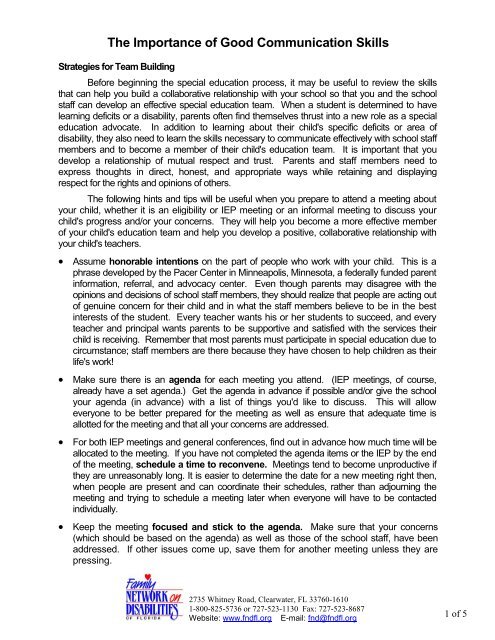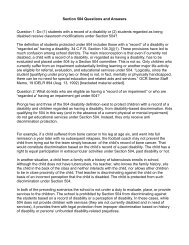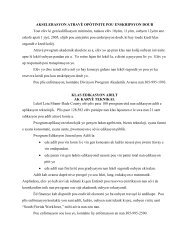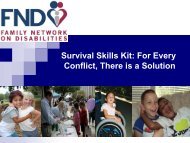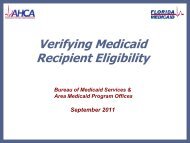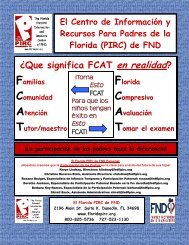The Importance of Good Communication Skills
The Importance of Good Communication Skills
The Importance of Good Communication Skills
Create successful ePaper yourself
Turn your PDF publications into a flip-book with our unique Google optimized e-Paper software.
want to do your own research about your child's disability and its educational impact so thatyou come to meetings feeling confident about your knowledge.• Understand the procedures and limitations <strong>of</strong> the system. It is important to know yourrights according to IDEA and other laws governing the education <strong>of</strong> students with disabilities.However, it is also important for you to realize that IDEA '97 may not specifically mandate someservices and/or rights you might feel are important. For example, you may express yourpreference for a specific teacher to your school principal, but having a child with special needsdoes not give you any more rights in choosing a teacher than parents <strong>of</strong> general educationstudents are given. Recognize, too, that while a school system cannot deny services to a studentbased on its financial limitations, they do not have to <strong>of</strong>fer the optimal program. <strong>The</strong> school mustprovide a program that is reasonably designed to <strong>of</strong>fer educational benefit. School systems dohave limitations in personnel, budgets, and resources that may make a difference between anoptimal program and a beneficial one.When you cannot seem to agree on a solution to an issue or concern:• Agree on a problem statement.• Brainstorm possible solutions. Express your ideas, even if they sound implausible or farfetched.<strong>The</strong> goal <strong>of</strong> brainstorming is to feel free to generate a lot <strong>of</strong> ideas without having anyonecriticize them. It may be that an idea that sounds far-fetched can later be modified into a planthat is reasonable. Additionally, people feel free to be more creative knowing that they will notbe criticized. It is at this point that you can bring up ideas that you have, but be careful not to becritical <strong>of</strong>, or angry at, suggestions <strong>of</strong>fered by staff members.• Clarify and discuss each possible solution. After brainstorming a complete list, go backover each idea and discuss its good and bad points, trying not to let the criticism reflect personallyon the participants.• Brainstorm possible consequences for each <strong>of</strong> the more probable solutions and discusswhy they may not work.• Clarify and discuss each <strong>of</strong> the possible consequences. Think about what might happenif an idea does not work. Sometimes you would only need to move on to another possiblesolution while in other instances the consequences <strong>of</strong> choosing the wrong solution would beserious.• Develop a plan and implement it. Go over it so everyone understands the plan and his orher role in it Make sure mat it is in writing and that each participant has a copy.• Evaluate progress and revise the plan if necessary. Set a date to meet to review the plan withall the participants.2735 Whitney Road, Clearwater, FL 33760-16101-800-825-5736 or 727-523-1130 Fax: 727-523-8687Website: www.fndfl.org E-mail: fnd@fndfl.org5 <strong>of</strong> 5
A Summary <strong>of</strong> <strong>Good</strong> <strong>Communication</strong> <strong>Skills</strong> and Steps in theDecision-Making and Problem-Solving Process• Assume honorable intentions.• Get or make an agenda.• Find out how much time will be allocated to the meeting.• Stay focused and stick to the agenda.• Organize your thoughts and concerns.• Leave "old baggage" behind.• Take someone with you to the meeting.• Ask questions.• Use active listening skills.• Take notes.• Follow up your meeting with a letter.• Sign any documents with which you feel comfortable; do not sign anydocuments with which you do not feel comfortable or about which you havequestions.• Help school staff members understand your culture and your cultural values.• End the meeting and agree on a date to reconvene if necessary.Should You Fail to Reach Agreement With the School Staff:• Accept the feelings <strong>of</strong> others about the issue.• Identify what is important or valued; focus on your child's needs and yourconcerns, not your position.• Realize that people's perceptions differ.• Accept that some people have emotional commitments to their positions.• Realize that people may come to a meeting with different expectations.• Know that some people may lack complete knowledge about the issue.• Understand the procedures and limitations <strong>of</strong> the system.When You Cannot Seem to Agree on a Solution to an Issue or Concern:• Agree on a problem statement.• Brainstorm possible solutions.• Clarify and discuss each possible solution.• Brainstorm possible consequences.• Clarify and discuss each <strong>of</strong> the possible consequences.• Develop a plan and implement it.• Evaluate progress and revise the plan if necessary.• Schedule a date to reconvene the meeting and evaluate the results.2735 Whitney Road, Clearwater, FL 33760-16101-800-825-5736 or 727-523-1130 Fax: 727-523-8687Website: www.fndfl.org E-mail: fnd@fndfl.org6 <strong>of</strong> 5


